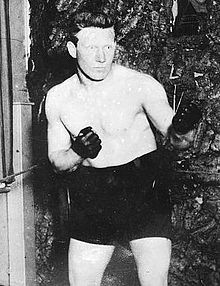Frank Moran
| Frank Moran | |
|---|---|
 |
|
| Statistics | |
| Real name | Charles Francis Moran |
| Nickname(s) | The Fighting Dentist |
| Rated at | Heavyweight |
| Nationality | United States Of America |
| Born | 18 March 1887 |
| Died | 14 December 1967 (aged 80) Hollywood, California |
| Boxing record | |
| Total fights | 66 |
| Wins | 36 |
| Wins by KO | 28 |
| Losses | 13 |
| Draws | 16 |
| No contests | 1 |
| Frank Moran | |
|---|---|
| Occupation | actor |
| Years active | 1928–1957 |
Francis Charles Moran (18 March 1887 – 14 December 1967) was an American boxer and film actor who fought twice for the Heavyweight Championship of the World, and appeared in over 135 movies in a 25-year film career.
Born in Cleveland, Ohio, to Martin and Mary Moran, immigrants from County Mayo, Ireland, Moran studied dentistry at the University of Pittsburgh where he also played football. He played professional football for the Pittsburgh Lyceums and Akron Pros as a guard and center.
While Moran was serving in the U.S. Navy in 1908, he knocked out fighter Fred Cooley in the second round. While serving on the U.S.S. Mayflower, he served as a spar partner for President Theodore Roosevelt. He began his career as a prize-fighter that same year with a match against Fred Broad. Soon, Moran, who had a hard right hand punch which he called "Mary Ann", became known as the "White Hope" of the teens. In 1914 he fought Jack Johnson for the Heavyweight Championship of the World, and in 1916 "The Fighting Dentist" went up against Jess Willard for the same title, but lost both bouts. He lost his last fight to Marcel Nilles for the Heavyweight Championship of France on December 22, 1922. He retired from boxing after 66 bouts with a record of 36 wins (28 by a knockout), 13 losses, 16 draws and 1 no contest.
After acting in one show on Broadway in 1926 – a stage adaptation of Theodore Dreiser's novel An American Tragedy – Moran made his film debut in 1928 when he did two silent films, The Chinatown Mystery and Ships of the Night, but his film career didn't start in earnest until 1933, when he appeared as himself in The Prizefighter and the Lady, and also in Mae West's She Done Him Wrong, in which he played a convict. This was typical of the kinds of roles Moran was to play for the next 25 years – gangsters, henchmen, "plug uglies", bartenders, stage hands, sailors, guards, cops, bouncers, moving men, sergeants and other soldiers – roles which belied his personal gentleness and sensitivity.
...
Wikipedia
